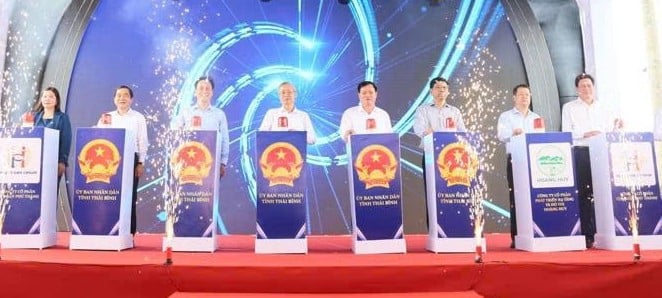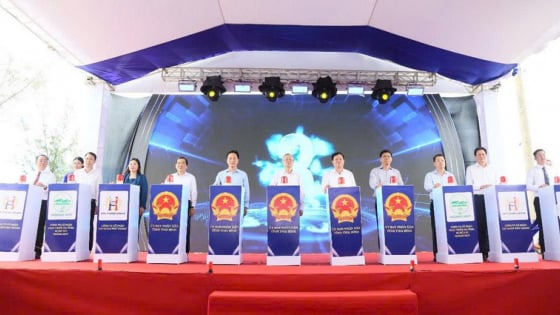By
Minh Hue
Tue, July 1, 2025 | 2:37 pm GMT+7
A groundbreaking ceremony was held on Saturday for the Con Vanh Golf Course and Ba Lat Liquid Cargo Port projects in the northern province of Thai Binh (now Hung Yen province).
Thai Binh and Hung Yen were merged to become Hung Yen province, starting from July 1, 2025. On June 12, the parliament passed a resolution that reduces the country’s number of provinces and cities from 63 to 34.
 Groundbreaking ceremony for the Con Vanh Golf Course and Ba Lat Liquid Cargo Port projects in Thai Binh province (now Hung Yen province), northern Vietnam, June 28, 2025. Photo courtesy of the province’s news portal.
Groundbreaking ceremony for the Con Vanh Golf Course and Ba Lat Liquid Cargo Port projects in Thai Binh province (now Hung Yen province), northern Vietnam, June 28, 2025. Photo courtesy of the province’s news portal.
With a total investment of VND2.5 trillion ($95.62 million), these projects, located in Tien Hai district, are expected to boost the province’s tourism and economic development and create new momentum for the Thai Binh Coastal Economic Zone.
The Con Vanh Golf Course project, invested by Hoang Huy Urban and Infrastructure Development JSC, was approved by the provincial People’s Committee in January 2025. It covers nearly 110 hectares with a total investment of VND2.16 trillion ($82.6 million).
The project includes a 27-hole international standard golf course, a control center, resort villas, a luxury hotel, a driving range, technical maintenance facilities, as well as supporting infrastructure such as green spaces, parking lots, and other amenities.
Once operational, the course is expected to bring significant socio-economic benefits. It will transform the mangrove area into a large-scale sports, entertainment and resort complex.
Preliminary estimates suggest annual tax revenues of around VND250 billion ($9.56 million) and employment for nearly 300 people, half of whom will be local residents. It will also increase land value in the planned area and surrounding real estate, thereby stimulating the development of other economic sectors.
The project will help realize the province’s goal of turning tourism and sports into key economic sectors, while preserving the region’s natural landscape and environment.
Meanwhile, the Ba Lat Liquid Cargo Port project, developed by Phu Thanh Group JSC, was approved by the Management Board of Thai Binh Economic Zone and Industrial Parks in November 2024. It spans nearly 7 hectares with a total investment of VND278 billion ($10.63 million).
The port includes a specialized berth capable of receiving ships of up to 3,000 tons, a warehouse system for storing liquid goods such as petroleum and chemicals, a modern reception and transshipment system, technology pipelines, and supporting technical and transport infrastructure directly connected to the coastal road and key industrial zones.
This is the first specialized liquid cargo port in Thai Binh, playing a vital role in the energy and raw materials supply chain serving the development of the Thai Binh Economic Zone.
It will enhance inland waterway transport, facilitates import-export activities for businesses, and supports economic development. At the same time, it leverages the local advantages of river mouths and coastal access.
The same day, work also commenced on a VND2.5 trillion ($95.62 million) waste-to-energy plant in Thuy Trinh commune, Thai Thuy district. The project is jointly developed by Dragonventures Investment and Development JSC and WangNeng Environmental JSC.
According to the design, the six-hectare plant will have a daily processing capacity of at least 600 tons of domestic and general solid waste, while generating electricity with a capacity of 15 MW per day.
The plant will apply modern waste incineration technology in a closed-loop, circular treatment process that meets international environmental standards. It aims to minimize landfill waste, generate energy from waste, and contribute to improving the local living environment.
Construction is expected to take just over two years, with completion and operations scheduled for the fourth quarter of 2026. Once operational, the plant will help reduce the burden on existing landfills in Thai Thuy district and surrounding areas, while contributing clean energy to the local power grid.







